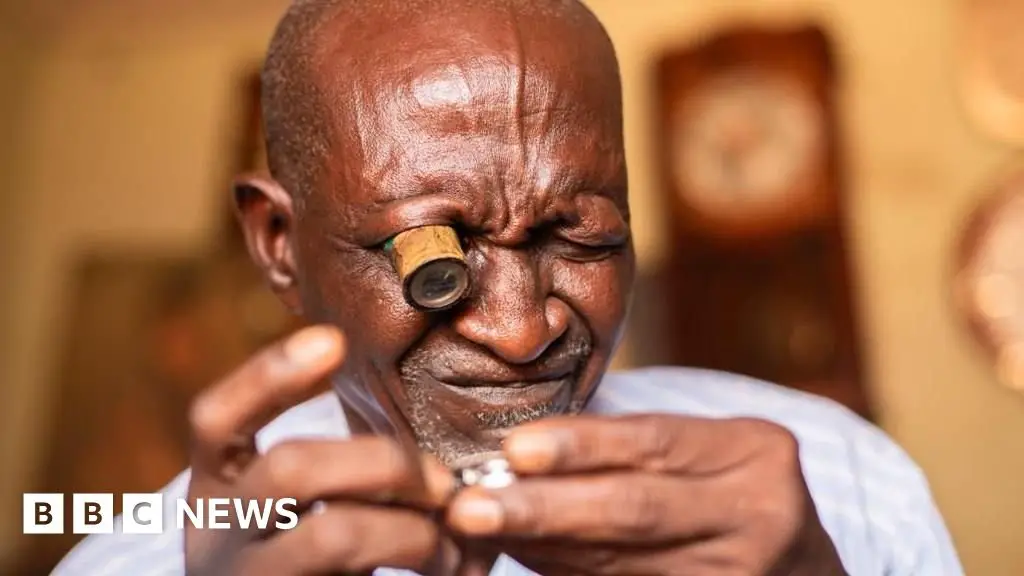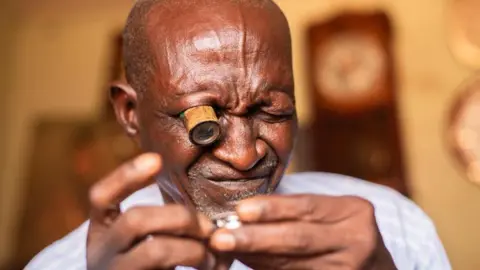 Ifiokabasi Ettang / BBC
Ifiokabasi Ettang / BBCTicking is the predominant sound in Bala Muhammad’s tiny watch repair shop, hidden on a busy street in the northern Nigerian city of Kaduna.
It’s like a time capsule from another era with numerous clocks on the wall and small tables at the entrance full of tools and clocks in various states of repair.
His shop is located on one of Kaduna’s busiest shopping streets – sandwiched between building material suppliers.
Until a few years ago, he always had customers coming in to have their watches repaired or a new battery installed.
“There were times when I got more than 100 watch repair orders in a day,” the 68-year-old, popularly known as Baba Bala, told the BBC.
But he fears that the skills taught to him and his brother by their father will die out.
“Some days there are no customers,” he says, blaming people using their cell phones to check the time for the decline in his trading.
“Phones and technology have taken away the only job I know and that makes me very sad.”
But the watch boom enabled the family to make a good living for more than 50 years.
“I used the proceeds from repairing wristwatches to build my house and provide my children with an education,” he says.
His father spent six months traveling all over West Africa – from Senegal to Sierra Leone – repairing watches.
Baba Bala once lived in the capital Abuja, home to many of the country’s elite – and made a good living tending to the watches of the rich.
He believes his best customers were top officials at the state-owned oil company Nigerian National Petroleum Company (NNPC).
Some had Rolex watches – these can vary greatly in price, but an average one costs around $10,000 (£8,000).
He says they are beautiful – and reflect his love for all Swiss watches. He himself owns a Longines, another renowned Swiss brand, which he only takes off when he sleeps.
“If I leave the house and forget it, I have to go back and get it. I won’t be without it – that’s how important it is to me.”
In his shop he keeps a beautiful large framed photograph of his father, Abdullahi Bala Isah, taken several years before his death in 1988 as he looked up from his workbench.
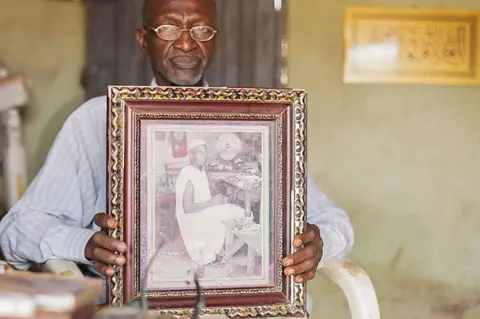 Ifiokabasi Ettang / BBC
Ifiokabasi Ettang / BBCIsah was a renowned watchmaker and his contacts in Freetown and Dakar called him for a trip when they had enough watches for him to take care of.
He also regularly visited Ibadan, a metropolis in southwest Nigeria – a literary center and home to the country’s first university.
Baba Bala says no one in the family knows where his father learned his expertise – but it was during the time of British colonial rule.
He himself was born four years before Nigeria gained independence in 1960.
“My father was a popular watch repairer and his skills took him to many places. He taught me when I was young and I’m proud to have followed in his footsteps.”
Baba Bala began to take a keen interest in the workings of the wheels and levers in a watch at the age of 10 – and was pleased to find that it became a good source of pocket money as she grew older.
“When my classmates in high school were broke, I had money to spend because I was already repairing watches.”
He recalls that his skills even impressed one of his teachers: “He had problems with some of his watches and had taken them to several places, but they couldn’t fix them. When he was told about me, I was able to fix all three.” wakes up until the next day.
Watches were once considered as important as clothes in Nigeria and many people felt lost without watches.
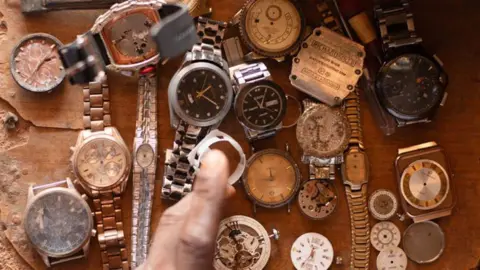 Ifiokabasi Ettang / BBC
Ifiokabasi Ettang / BBCThere used to be a separate area in Kaduna where many watch sellers and repairers set up shop.
“The place was demolished and now stands empty,” says Baba Bala sadly, adding that most of his colleagues are either dead or have given up the business.
One of those who admitted defeat was Isa Sani.
“Going to my workshop every day meant sitting down and not getting any work – that’s why I decided to stop in 2019,” the 65-year-old told the BBC.
“I have land and my children help me farm it – that’s how I make a living these days.”
He laments, “I don’t think watches will ever make a comeback.”
The youths who work in the building materials stores next to Baba Bala agree.
Faisal Abdulkarim and Yusuf Yusha’u, both 18 years old, never owned watches because they never saw a need for them.
“I can check the time on my phone at any time and always have it with me,” said one.
Dr. Umar Abdulmajid, a communications lecturer at Yusuf Maitama University in Kano, believes things could change.
“Traditional watches are undoubtedly dying out and with them jobs like watch repairs, but with the smartwatch I think they could make a comeback.”
“The fact that a smartwatch can do much more than just tell the time means it could continue to attract people.”
He suggests old watch repairers get to grips with this new technology: “If you don’t keep up with the times, you’ll be left behind.”
But Baba Bala, who returned to Kaduna from Abuja about 20 years ago to start his business because he wanted to be closer to his growing family, says that doesn’t interest him.
“That’s what I love, I consider myself a sick watch doctor – plus I’m not getting any younger.”
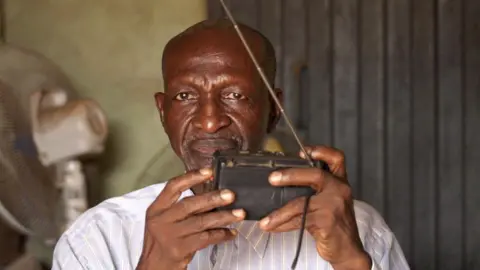 Ifiokabasi Ettang / BBC
Ifiokabasi Ettang / BBCHis close-knit family remains loyal to his profession – his wife and all five children wear watches and often stop by to visit him in the shop, where some of the timepieces on display are forgotten relics of old customers.
“Some brought them many years ago and haven’t come back to pick them up,” he said.
But Baba Bala refuses to give up and still opens up every day: his eldest daughter, who runs a successful fashion boutique nearby, helps him with bills when his business stagnates.
Without much to occupy him – or the chatter and gossip of his customers – Baba Bala says he now often listens to his radio for company and enjoys the Hausa language programs on the BBC World Service.
In the afternoon, his youngest son Al-Ameen comes to visit after school – the only one of his children who shows interest in learning the art of watch repair. But he didn’t want to encourage him to pursue this profession.
He’s happy that the 12-year-old told him he wanted to be a pilot – continuing the family tradition of seeing more of the world.
In the cockpit he was confronted with many clock-like dials – not unlike his father’s workshop.
You may also be interested in:
 Getty Images/BBC
Getty Images/BBC

